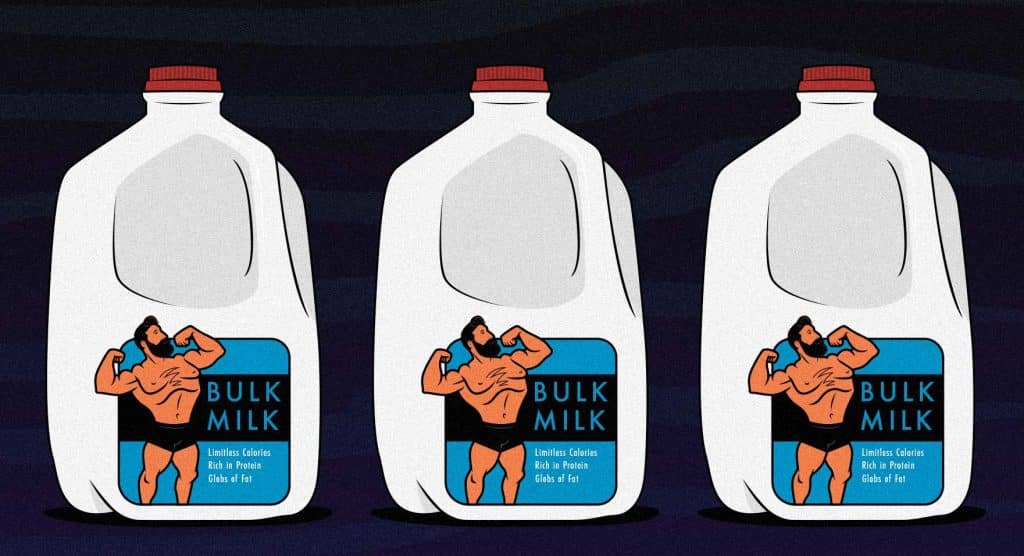
Is Low-Fat or Whole-Fat Dairy Better for Bulking?
I know this is a bit of a niche topic, but it’s something almost every bulker will need to contend with at some point: should you be drinking skim milk or whole-fat milk? What about the fat in cheese? And which type of yogurt should you buy?
There are two concerns with dairy fat:
- Dairy fat has calories, and if you eat too many calories, you’ll gain too much weight, and you’ll gain too much fat. If you’re bulking, this is a boon. It’s good to have easy sources of calories. But if you’re trying to cut back, by all means, go for low-fat dairy. You’ll get more protein with less fat.
- Dairy fat is high in saturated fat. This is the bigger and more controversial problem. Eating too much saturated fat can drive up blood cholesterol levels and markers of inflammation, increasing your risk of heart disease. But there’s some important nuance here.
How Much Saturated Fat Can You Have While Bulking?
The typical dietary advice you’ll hear is to limit saturated fat to less than 6–10% of your total calories (American Heart Association, Dietary Guidelines for Americans). That advice isn’t too controversial. Even those citing the benefits associated with diets higher in saturated fat usually reference studies where people get less than 10% of their calories from saturated fat (study, study).
Also, the studies showing benefits from higher intakes of saturated fat tend to be observational. They don’t show that eating more saturated fat is good, just that people with diets that were low-but-not-super-low in saturated fat tended to live longer or have fewer strokes. Perhaps that’s because they eat more dairy. We’ll get into that in a second.
But first, there’s one more thing we need to consider. Most of these studies were conducted on people eating relatively few calories, often around 2,000–2,500 per day. If you’re bulking, you’ll probably be eating quite a bit more than that. Does that mean you get to eat extra saturated fat? As in, if you’re eating 3,500 calories per day, do those extra 1,000–1,500 calories mean you get to eat an extra 10–15 grams of saturated fat?
I suspected no, but I wasn’t sure, so I spoke with Dr. Eric Trexler, a sports nutrition turned metabolism researcher at Duke University. He told me that limiting your saturated fat intake to 10% of total calories makes sense under normal circumstances, but that when you’re bulking, you should probably keep an even tighter rein on it:
“Total amount is probably more meaningful, but we don’t have much research that tackles this question directly. I suppose an even easier heuristic would be 25-30 grams [of saturated fat] per day, which roughly assumes 10% of calories from a ‘typical’ diet of around 2,000-2,500 kcal/day.”
But there’s more nuance to this. Different types of foods have different impacts on blood lipids, even when they contain the same amount of saturated fat (study). Most people get the bulk of their saturated fat from processed foods, rather than from unprocessed meats, dairy products, and cocoa. And when you get your saturated fat from healthier food sources, it tends to have a healthier effect. Let’s zoom in on dairy.
Is Dairy Fat Healthy?
There’s an enormous amount of epidemiological evidence showing that dairy consumption either has no impact on heart disease or helps to prevent it (study, study, study, study, study). Some of these studies were huge, too, spanning dozens of countries and observing hundreds of thousands of participants over many years.
Generally, unfermented dairy products (such as milk) had a neutral effect on our health, whereas fermented dairy products (like cheese, yogurt, and kefir) were more likely to have a positive effect. One study found an association between whole-fat milk and heart disease, but it’s somewhat of an outlier.
To be clear, that doesn’t mean the saturated fat in dairy isn’t a problem, just that dairy, on balance, in the way that most people eat it, is probably neutral or healthy overall.
If we look at meta-analyses of randomized controlled trials, most dairy products don’t affect inflammation, blood lipids, blood pressure, blood sugar, or fat gain (meta, meta). Still, it could be that the saturated fat in dairy is still somewhat bad, but that the other health benefits of dairy overpower that downside.
And indeed, that seems to be what’s going on. There’s a membrane encasing the fat droplets in most dairy products, and it appears to be quite good for us. There are other nutrients in dairy fat that can have a positive effect on your metabolic health, too, including trans-vaccenic acid, trans-palmitoleic acid, and short-chain and medium-chain fatty acids.
Unfortunately, butter is processed in a way that removes the milk-fat globule membranes. That means that even when compared against dairy products with comparable amounts of saturated fat (like cheese and cream), butter has a worse effect on our health.
So, on balance, it seems that the fat in most dairy products is either neutral or healthy, with the notable exception of butter (and perhaps whole milk, though that’s less clear). We also have research showing that when you swap out butter for extra-virgin olive oil, you can improve a bunch of health markers (study). So, that’s what we did.
Is Low-Fat or Whole-Fat Dairy Better for Building Muscle?
There’s an interesting study where they gave participants either whole milk or low-fat milk as a post-workout protein drink (study). Whole milk has more fat (per calorie) and low-fat milk has more protein (per calorie), so you’d think that when calories are matched, the low-fat milk would be better for building muscle. But the whole milk had a greater impact on muscle-protein synthesis, suggesting it may be better for building muscle.
I wouldn’t read too much into one study, and there’s also that meta-analysis (mentioned above) suggesting that consuming large amounts of whole milk might not be great for your health. Still, it could be that whole milk has a unique muscle-building advantage. Maybe that benefit carries over to yogurt and cheese, giving you the benefit without the potential downside.
Conclusion
After considering all of this, the choice I made for myself is to have reasonable amounts of cheese, yogurt, and kefir without really worrying about how much fat they have. Those foods are associated with better long-term health, and they seem just as healthy in short-term randomly controlled trials.
However, I swapped out butter for extra-virgin olive oil, and I usually opt for low-fat, high-protein milk. And I drink a fair bit of milk. If I’m bulking, I’ll often have a litre of milk a day (a bulking technique known as LOMAD). If that milk were higher in fat, my overall intake of saturated fat would be too high. And I have familial hypercholesterolemia, so I try to play it extra safe.
When I’m working with clients, I don’t have a problem with people drinking moderate amounts of whole milk or eating some butter while bulking, especially if they have good genetics for heart disease and/or they’re getting their blood lipids checked. And, obviously, I’m just here to help as best I can. You can make whatever decision you want for yourself.

If you want our help, we include a full nutrition guide and recipe book in our Bony to Beastly Bulking Program and Legends: Health & Aesthetics Program. We take this stuff seriously. We’ll teach you how to eat a bulking diet that’s healthy and balanced, and that’s perfect for building muscle leanly. We include a full recipe book, too, with all the macros calculated out and all the micronutrients balanced.
Both of those programs also include a full workout program, tutorial videos teaching every exercise, a full training guide, and personal support from us.


Muscle-Building Mini-Course via Email
Sign up for our 5-part muscle-building mini-course that covers everything you need to know about:
Here are some related articles